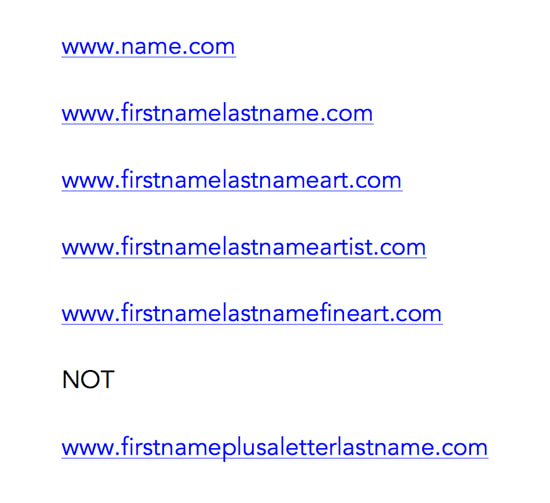- Home
- NEWS
-
PRACTICE
-
MARKETING
- How to write an Artist's Statement >
- How to write an Artist's Resume or CV >
- How to sign a painting, drawing or fine art print
- Business Cards for Artists
- How to write a press release for an artist
- The Private View Invitation
- Publicity for Juried Exhibitions
- Websites for Artists >
- Image & Video sizes for Social Media Sites
- How to be mobile-friendly
-
SELL ART
- FRAME ART
-
SHIP ART
-
COPYRIGHT
-
MONEY & TAX
- About + Help
- BANKING
Why have a website?
|
They are ubiquitous
They help get your name known
|
They help market your artwork
Your website provides information about your credibility and authenticity.
"Build it and they will come" concepts of websites were debunked a long time ago. Just creating a website will NOT generate traffic! They help sell your art
|
Why design and functionality matter
|
Websites stand or fall by their DESIGN AND FUNCTIONALITY as well as their content. See also Web design for artists |
|
Websites can impress if they work well.
Browsing is increasingly done via mobile devices. A website is not fully functional if it cannot be viewed on a tablet or a smartphone. The emphasis is now on websites which can be viewed on any device of any size. To do this you MUST use a responsive template which enables a version of your website to be viewed on every format and size of screen. |
Image size and quality is very important for artists
|
Your Art Business Name Matters!
|
You need to decide pretty early on what you're going to be known as online - and what your 'trading name' is going to be
Check out what happens when you search the internet for your name. Have you got competition? |
REFERENCE:
|
How to have an impact on the Internet!
|
If you've been selected for an open exhibition / art competition...
Make sure you use the opportunity for some free publicity to raise your profile via your website. DO make sure that:
|
All about you!
Make sure your website includes the basics. These are
|
|
Banner image is by Edho Pratama via Unsplash
|
ADVERT
|
ABOUT ART BUSINESS INFO. FOR ARTISTS
This website aims to provide a compendium of resources about the art business for artists. Please read "PLEASE NOTE"
It helps artists learn how to do better at being business-like, marketing and selling their art and looking after their financial security.
This website aims to provide a compendium of resources about the art business for artists. Please read "PLEASE NOTE"
It helps artists learn how to do better at being business-like, marketing and selling their art and looking after their financial security.
|
Copyright: 2015-2021 Katherine Tyrrell | Making A Mark Publications
- all rights reserved If you've got any suggestions for what you'd like to see on this website please send me your suggestion
|
PLEASE NOTE:
1) Content and the law change all the time. It's impossible to keep up with it if you're not working on the topic full time. 2) I research topics carefully. However, I am totally unable to warrant that ANY and/or ALL information is
|
3) Hence all information I provide comes without any LIABILITY whatsoever to you for any choices you make.
4) This website is FREE FOR YOU but not for me. Links to books are Amazon Affiliate links. Buying a book via this website means I get a very small payment which helps to fund and maintain this website. .I much appreciate any support your provide. Adverts are provided by Google AdSense - but the adverts do not mean I endorse the advertiser. |
- Home
- NEWS
-
PRACTICE
-
MARKETING
- How to write an Artist's Statement >
- How to write an Artist's Resume or CV >
- How to sign a painting, drawing or fine art print
- Business Cards for Artists
- How to write a press release for an artist
- The Private View Invitation
- Publicity for Juried Exhibitions
- Websites for Artists >
- Image & Video sizes for Social Media Sites
- How to be mobile-friendly
-
SELL ART
- FRAME ART
-
SHIP ART
-
COPYRIGHT
-
MONEY & TAX
- About + Help
- BANKING


